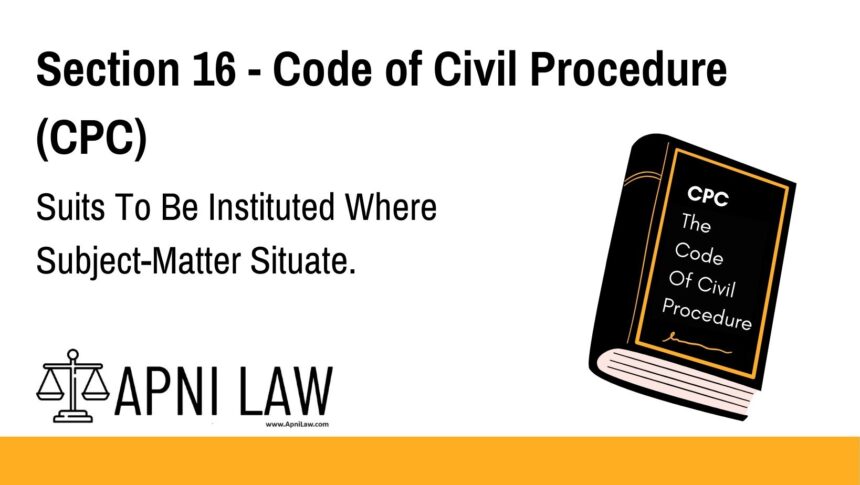Code
Subject to the pecuniary or other limitations prescribed by any law, suits—
(a) for the recovery of immovable property with or without rent or profits,
(b) for the partition of immovable property,
(c) for foreclosure, sale or redemption in the case of a mortgage of or charge upon immovable property,
(d) for the determination of any other right to or interest in immovable property,
(e) for compensation for wrong to immovable property,
(f) for the recovery of movable property actually under distraint or attachment,
shall be instituted in the Court within the local limits of whose jurisdiction the property is situate:
Provided that a suit to obtain relief respecting, or compensation for wrong to, immovable property held by or on behalf of the defendant may, where the relief sought can be entirely obtained through his personal obedience, be instituted either in the Court within the local limits of whose jurisdiction the property is situate, or in the Court within the local limits of whose jurisdiction the defendant actually and voluntarily resides, or carries on business, or personally works for gain.
Explanation: In this section “property” means property situate in India.
Explanation
Section 16 of the CPC lays down rules related to the institution of suits concerning immovable property. It states that suits dealing with rights in immovable property, such as recovery, partition, mortgage disputes, or injury to such property, must be filed in the court within whose territorial jurisdiction the property is located.
However, the proviso offers flexibility: if the relief can be granted solely by enforcing personal compliance from the defendant, the suit may be filed either at the place where the property is situated or where the defendant lives or works.
This section ensures that disputes concerning immovable property are dealt with by courts located in proximity to the property itself.
Illustration
- If X owns a plot in Delhi and Y encroaches on it, X must file a suit in a Delhi court, since the property is located there.
- If the relief is in the nature of compensation from Y (who lives in Mumbai), and it can be obtained through his personal obedience, then X may alternatively sue Y in Mumbai.
Common Questions & Answer
Q1. Can a suit for partition of ancestral property in Punjab be filed in a court in Delhi if the plaintiff resides in Delhi?
No. Since the subject matter is immovable property situated in Punjab, the suit must be filed in the competent court in Punjab, as per Section 16.
Q2. What does “property situated in India” mean in the Explanation?
It means that Section 16 applies only to property physically located within the territorial boundaries of India.
Q3. If a suit is about damages caused to a house, where should it be filed?
Such a suit falls under clause (e) – “compensation for wrong to immovable property” – and should be instituted in the court where the house is situated.
Q4. What if multiple properties are involved in different jurisdictions?
In such cases, Section 17 CPC comes into play, allowing the suit to be filed in any court within whose jurisdiction any one of the properties is situated.








